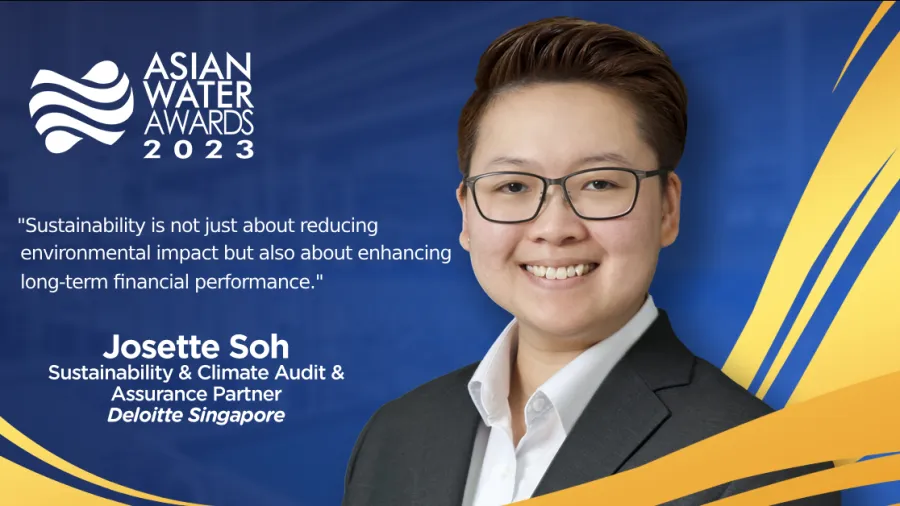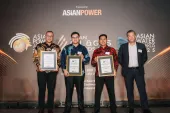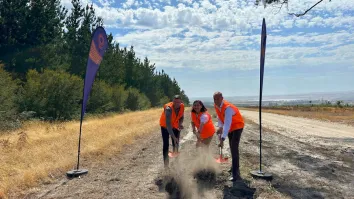
Deloitte’s Josette Soh emphasises sustainability as strategic business imperative, encourages collaboration with finance teams
“Sustainability is not merely about reducing environmental impact, but also about enhancing long-term financial performance.”
In the face of escalating challenges posed by climate change and the growing spectre of resource scarcity, the imperative for implementing sustainable practices, particularly in managing water resources, has assumed unprecedented importance. Climate variability and change are impacting the distribution, quality, and availability of freshwater resources. Consequently, the adoption of ecologically sound and scientifically informed strategies for water resource management is essential.
This necessitates a paradigm shift towards sustainable water utilisation and conservation methodologies, underpinned by scientific assessment and innovative technological solutions. As global populations continue to grow and water-intensive industries expand, the pressing need to safeguard the integrity and resilience of water systems has never been more evident.
Josette Soh, Sustainability & Climate Audit & Assurance Partner at Deloitte Singapore, has an impressive career spanning over 15 years, with her professional journey deeply rooted in the financial and non-financial aspects of sustainability.
In her current role, she leads the Environmental, Social and Governance (ESG) Assurance practice, offering diverse services including narrative reporting, climate reporting, and ISAE 3000 assurance. Apart from being an industry specialist, Josette also excels as a corporate trainer, sharing her insights with listed companies and multinationals. She has been a guest speaker at events organised by the Institute of Singapore Chartered Accountants (ISCA), ACCA, and CPA Australia.
In this interview with Josette, she emphasised the interconnectedness of financial and non-financial aspects in corporate reporting. She also shared her insights on technology’s role in the water sector, along with her view of the future of ESG reporting and assurance practices in the coming years.
As a corporate trainer, you’ve led numerous sessions on sustainability and accounting for listed companies and multinationals. How do you bridge the gap between financial and non-financial aspects, and what are the common misconceptions you encounter whilst educating professionals about sustainability practices?
I usually highlight the interconnectedness of the financial and non-financial aspects in corporate reporting, and emphasise that sustainability is not just about reducing environmental impact but also about enhancing long-term financial performance.
One key misconception I often encounter is the belief that sustainable practices are inherently costly. In reality, integrating sustainability into business operations can lead to cost savings through efficient resource utilisation and risk mitigation. Therefore, I help professionals
understand that sustainability is a strategic business imperative. It is also crucial to encourage conversations between finance and sustainability teams to foster collaboration and enable them to align their goals and measure outcomes effectively.
The integration of digital technologies is becoming increasingly important in various industries. How do you see these technologies playing a transformative role in the water sector?
Digital technologies can benefit the water sector by enhancing efficiency, monitoring, and decision-making. Advanced sensor networks, real-time data analytics, and predictive modelling enable those in the sector to optimise water treatment processes, minimise leaks and waste, and enhance resource allocation. Digital solutions can also facilitate remote monitoring of water quality, enabling swift responses to threats of contamination. IoT (Internet of Things) devices and AI-driven analytics enable utility companies to anticipate maintenance needs and reduce downtime. Overall, these capabilities play a transformative role by promoting operational efficiency, reducing costs, and improving overall sustainability in the water sector.
The power and utilities sector faces the challenge of balancing environmental impact, customer demands, and financial viability. How do you work with clients to navigate these complex dynamics, and what strategies have you found effective in helping utilities move towards net zero goals whilst maintaining their economic stability?
I advocate for a holistic approach that involves identifying opportunities where environmental and customer-centric initiatives align with financial goals. Collaborative stakeholder engagement and communication are crucial to understanding diverse perspectives and finding common ground. In addition, implementing transparent reporting mechanisms enables companies to showcase their progress towards their sustainability goals, fostering stakeholder trust and support.
In your opinion, what are the current gaps or areas of improvement in ESG reporting and assurance practices in Southeast Asia, and how do you foresee these evolving in the coming years?
Prior to the adoption of the International Financial Reporting Standards (IFRS) International Sustainability Standard Board (ISSB) Standards issued in June 2023, the major gap throughout the world was the lack of standardisation of reporting metrics and frameworks.
Each company’s response towards the evolving regulatory requirements and stakeholder expectations varies. Looking ahead, and with the arrival of the ISSB Standards, we expect ESG reporting practices to evolve and become more comprehensive and standardised.
Similarly, the Southeast Asia (SEA) region will be looking towards a comprehensive, stand-alone standard suitable for limited and reasonable sustainability assurance engagements. The International Auditing and Assurance Standards Board (IAASB) has issued an exposure draft: International Standard on Sustainability Assurance (ISSA) 5000, General Requirements for Sustainability Assurance Engagements. This can apply to sustainability information reported across any sustainability topic prepared under multiple frameworks. In addition, the standard will be profession-agnostic, enabling its use by professional accountants and other professionals performing sustainability assurance engagements.
We foresee a growing demand for third-party assurance advisors in the sustainability space.Capability building will be expected for preparers and assurance service providers, which will lead to the availability of new sustainability careers in the marketplace.
Regulators in SEA are likely working on ISSB adoption plans and setting up national accreditation bodies to regulate the local assurance practices. This will help establish a level playing field and encourage meaningful sustainability efforts.
Given the long-term nature of infrastructure projects in the power and utilities sector, how do you anticipate future trends and technological advancements to ensure the sustainability and relevance of these projects over time?
Project teams can collaborate with research institutions and technology experts to stay informed about emerging trends. Teams can also conduct regular project reviews and assessments to evaluate whether projects remain aligned with the latest technological developments and sustainability goals. In addition, teams should foster a culture of continuous learning and adaptation so that infrastructure projects can maintain their value and impact over time.
As a judge at the Asian Water Awards, what qualities do you look for when assessing nominees? What aspects make a water-related project stand out and demonstrate its contribution to sustainability, innovation, or community impact?
I look for projects that demonstrate a comprehensive approach to sustainability, innovation, and community impact. Firstly, the project should showcase effective water management practices that minimise pollution and ecosystem disruption. Secondly, it should include some degree of innovation or novel approaches to address water challenges. Thirdly, the project should have a positive contribution towards the community – projects that involve local stakeholders, prioritise social inclusivity, and create positive societal outcomes resonate strongly.
Ultimately, I value projects that not only advance water sustainability but also inspire others to embrace similar transformative efforts.



















 Advertise
Advertise







